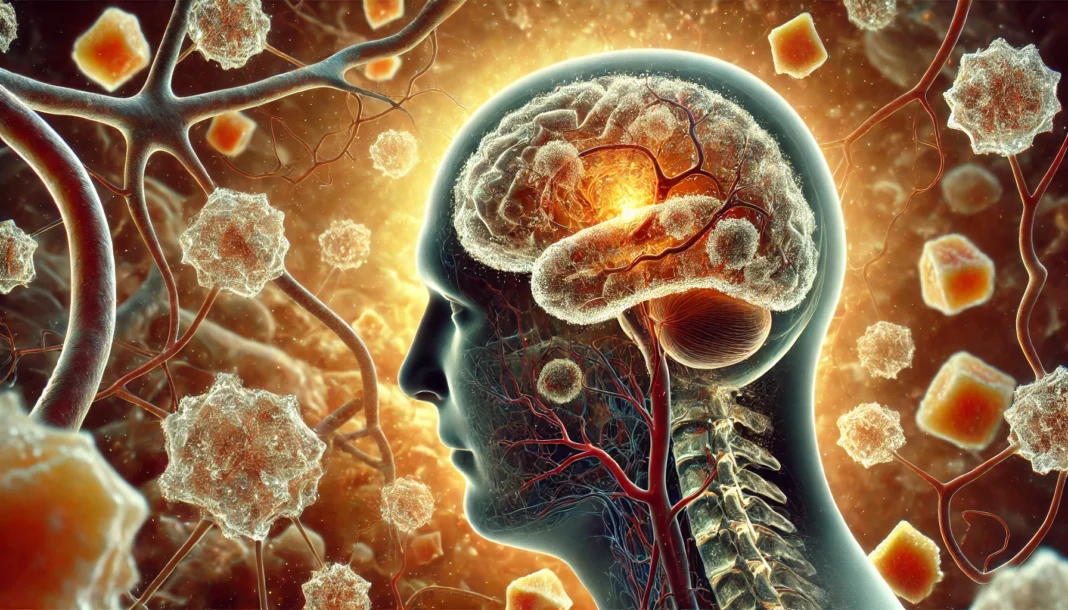The Hidden Impact of Diabetes on Brain Health: Why It Deserves More Attention
When most people think of diabetes, what often comes to mind are its effects on blood sugar, insulin regulation, and complications like nerve damage, kidney failure, or vision loss. What frequently gets overlooked, however, is how diabetes quietly influences the most vital organ of all—the brain. Recent research is shedding new light on a connection that’s proving to be more complex and concerning than previously believed. From persistent mental confusion to disorienting episodes of brain fog, the impact of diabetes on cognitive health is becoming increasingly evident. But how does diabetes affect the brain? Can diabetes cause brain fog, memory loss, or even long-term brain damage? And perhaps more urgently—what can be done to protect brain function while managing this chronic condition?
You may also like: Best Vitamins for Metabolism: How Science Supports Their Role in Energy and Weight Management
Understanding the intricate relationship between diabetes and the brain requires more than just a passing glance. It demands a thorough exploration of how high blood sugar alters neurological processes, impairs memory, and disrupts emotional regulation. By grasping the scientific mechanisms at play and recognizing early signs of cognitive distress, those living with diabetes can begin to implement targeted strategies that improve not just physical health, but also mental clarity and overall cognitive resilience. This article dives deeply into the growing evidence on how diabetes brain fog manifests, what causes it, and what steps can be taken to reduce its impact—before it becomes a long-term cognitive concern.

The Science Behind Diabetes and the Brain: A Delicate Balance Disrupted
The human brain is an energy-intensive organ, relying on a steady supply of glucose to fuel its many functions—from decision-making and memory consolidation to mood regulation and coordination. In healthy individuals, glucose enters the brain in carefully regulated amounts, controlled by insulin and other hormones that maintain homeostasis. In people with diabetes, however, these regulatory systems falter. When blood glucose levels remain consistently elevated, or swing dramatically, the brain’s delicate environment becomes disrupted. This is where the earliest signs of what many refer to as “sugar brain fog” often begin to emerge.
What’s particularly important to understand is that both Type 1 and Type 2 diabetes can contribute to brain dysfunction, although the mechanisms may differ slightly. In Type 1 diabetes, insufficient insulin production can starve the brain of glucose during hypoglycemic episodes. In contrast, Type 2 diabetes often involves insulin resistance, where the body produces insulin but the brain and other organs cannot use it effectively. Either way, the result is a brain that is poorly nourished, inflamed, and increasingly prone to damage.
Research shows that chronic hyperglycemia—the hallmark of uncontrolled diabetes—leads to increased oxidative stress and inflammation in brain tissues. This environment is toxic to neurons and can disrupt the connections between them, slowing down thinking, impairing short-term memory, and leading to a general sense of mental cloudiness. Over time, this can progress to more serious conditions such as cognitive decline and even vascular dementia. It becomes clearer with each study that diabetes brain fog is not merely an occasional inconvenience, but a sign of a deeper neurological disruption that needs to be addressed urgently.
What Exactly Is Diabetes Brain Fog?
The term “diabetes brain fog” may sound vague or even non-clinical, but for those who experience it, the symptoms are anything but subtle. This cognitive cloudiness can manifest as forgetfulness, trouble focusing, slowed mental processing, and difficulty recalling words or names. Many individuals describe it as a frustrating barrier between themselves and their normal mental sharpness. It’s important to note that diabetes and foggy brain symptoms often go hand-in-hand, especially when blood sugar levels are unstable.
Diabetes brain fog symptoms can be both episodic and chronic. For some, it appears during periods of high or low blood sugar, dissipating once levels normalize. For others, especially those with longstanding diabetes or poor glycemic control, the fog may linger for days or weeks at a time. The experience can be unsettling, especially when it begins to interfere with work, relationships, or the ability to perform routine tasks.
One key distinction in diabetes-related brain fog is its correlation with blood sugar fluctuations. While fatigue, stress, or poor sleep can cause mental fogginess in anyone, diabetic brain fog is unique in its tie to metabolic dysregulation. It can arise shortly after meals high in carbohydrates, during skipped meals, or after insulin adjustments. Understanding these triggers is essential for managing diabetes brain fog treatment effectively and minimizing its impact on daily life.
High Blood Sugar and Its Neurological Fallout
To understand how high blood sugar impacts the brain, one must first appreciate the concept of glucose toxicity. In a healthy brain, glucose is used efficiently as a fuel. But when blood sugar levels are chronically elevated, the excess glucose begins to damage the very cells it’s supposed to nourish. This toxic state can disrupt neural communication, interfere with neurotransmitter balance, and increase the permeability of the blood-brain barrier, making the brain more vulnerable to infections and inflammation.
Among the most concerning consequences of prolonged hyperglycemia is its role in promoting cognitive dysfunction. Studies have found that adults with poorly managed diabetes perform worse on tests of memory, attention, and executive function compared to those with well-regulated blood sugar. This has led researchers to explore the mechanisms linking blood sugar and brain fog, with many studies pointing to reduced brain volume in areas responsible for memory and decision-making.
Further compounding the problem is the inflammatory response triggered by high blood sugar. Chronic inflammation in the brain can lead to cellular damage and is increasingly being recognized as a contributing factor to Alzheimer’s disease. The connection has become so significant that some researchers now refer to Alzheimer’s as “Type 3 diabetes.” This underscores the importance of not only asking “can high blood sugar cause confusion?” but recognizing that sustained hyperglycemia may contribute to lasting changes in brain structure and function.
Does Diabetes Affect Memory? Emerging Evidence Suggests Yes
A growing body of evidence now supports the idea that diabetes can indeed affect memory. Memory problems are one of the most commonly reported symptoms among individuals with long-term diabetes, and they often serve as an early warning sign of more serious cognitive decline. While memory lapses can be subtle at first—misplacing keys, forgetting names, or needing to re-read information—they can become progressively worse if blood sugar is not managed carefully.
Memory impairment in diabetes is thought to result from several overlapping mechanisms. One is the aforementioned impact of chronic high blood sugar on brain cells and neural pathways. Another involves insulin resistance in the brain. Although insulin is best known for its role in glucose metabolism, it also plays a critical role in cognitive function. In the brain, insulin helps regulate the release of key neurotransmitters like acetylcholine, which are involved in memory and learning. When the brain becomes resistant to insulin, as it often does in Type 2 diabetes, these cognitive processes begin to falter.
Can diabetes affect memory permanently? The answer depends on the severity and duration of the condition, as well as how well it is managed. Short-term memory problems may improve with better glycemic control, dietary changes, and physical activity. However, long-standing diabetes with repeated episodes of hyperglycemia or hypoglycemia can cause more enduring damage. This is why early intervention and proactive management are crucial—not just for physical health, but for preserving cognitive vitality as well.
Can High Sugar Cause Confusion and Emotional Dysregulation?
It’s not just memory that’s affected by fluctuating blood sugar levels. Confusion and mood swings are also common in individuals with diabetes, particularly when blood sugar is significantly outside the normal range. Can high sugar cause confusion? Absolutely, and it often does so in ways that are both sudden and severe. For example, individuals with extremely elevated glucose levels may experience difficulty concentrating, disorganized thoughts, or a profound sense of disorientation. In older adults, high blood sugar-induced confusion is sometimes mistaken for dementia or delirium.
The neurological basis for this confusion lies in the brain’s response to energy imbalance. When glucose is either too low or too high, the brain struggles to function effectively. High blood sugar can cause swelling in brain tissues, disrupt neural communication, and affect neurotransmitter activity. In some cases, it can even lead to seizures or a condition known as hyperosmolar hyperglycemic state (HHS), a potentially life-threatening complication that includes extreme confusion and coma.
Beyond these acute episodes, the long-term effects of uncontrolled blood sugar can lead to subtle yet persistent forms of cognitive impairment. People may notice they have trouble following conversations, keeping track of time, or completing familiar tasks. These symptoms fall under the broader category of diabetes and mental confusion and should never be dismissed as just stress or aging. Proper diagnosis, ongoing monitoring, and lifestyle interventions can help mitigate these effects and protect brain function over time.
Why Blood Sugar Stability Is Key to Mental Clarity
The consistent management of blood sugar levels is perhaps the most effective strategy for reducing or even preventing diabetic fog and mental confusion. Sudden spikes and drops in glucose levels are particularly harmful to the brain because they impair its ability to access a steady energy supply. Just as a car engine misfires when it doesn’t get the right fuel mixture, the brain falters when glucose availability is erratic or excessive.
The importance of stable blood sugar is especially evident when examining the lived experiences of those with diabetes. Many people report a marked improvement in mental clarity when they maintain tighter glycemic control. Their thinking becomes sharper, their moods more stable, and their memory more reliable. It is no coincidence that effective diabetes brain fog treatment often begins with a renewed commitment to blood sugar monitoring, balanced nutrition, and regular physical activity.
Strategies such as eating low-glycemic index foods, avoiding processed sugars, and ensuring regular meal times can make a noticeable difference in cognitive function. For those using insulin, learning to anticipate how different foods and activities affect blood sugar levels is essential. Stress management and sleep hygiene also play important roles, as both can influence insulin sensitivity and, in turn, impact mental clarity. In this way, managing blood sugar is not just about preventing long-term complications—it is about preserving everyday quality of life and protecting the most vital aspects of one’s cognitive identity.
Building a Brain-Friendly Lifestyle with Diabetes in Mind
Developing a brain-friendly lifestyle while managing diabetes involves more than medication and dietary tweaks. It requires a holistic approach that integrates mental wellness, cardiovascular health, and neurological support. Activities such as aerobic exercise and strength training can boost insulin sensitivity, enhance blood flow to the brain, and stimulate the release of brain-derived neurotrophic factor (BDNF), a protein linked to neuroplasticity and cognitive function.
Cognitive stimulation is equally important. Engaging in mentally challenging activities such as puzzles, reading, learning new skills, or socializing with others can build cognitive reserve—the brain’s ability to compensate for damage. When paired with stable glucose control, these efforts become powerful tools for combatting diabetes brain damage symptoms and preserving mental agility.
Sleep hygiene also plays a crucial role. Poor sleep disrupts glucose metabolism and increases the risk of insulin resistance, both of which are associated with worsened cognitive performance. Creating a consistent bedtime routine, minimizing caffeine and screen time before bed, and treating sleep apnea (which is common in people with Type 2 diabetes) can contribute significantly to brain health. These simple yet strategic changes can work together to create a lifestyle that not only manages diabetes, but supports long-term cognitive resilience.
The Connection Between Inflammation, Insulin Resistance, and Brain Aging
As we look deeper into the question “how does diabetes affect the brain,” it becomes clear that inflammation and insulin resistance are central culprits. Chronic inflammation, often driven by elevated glucose and triglycerides, damages neurons and promotes the development of neurodegenerative diseases. The more this process continues unchecked, the more likely it becomes that someone with diabetes may experience accelerated cognitive aging.
Insulin resistance in the brain further complicates this issue. It impairs neuronal communication, reduces the brain’s ability to repair itself, and interferes with the regulation of dopamine and serotonin—neurotransmitters crucial for mood and motivation. These changes explain why diabetes and mental confusion frequently co-occur, and why individuals with diabetes are at increased risk for depression, anxiety, and even apathy.
This understanding reinforces the importance of early and aggressive management of diabetes—not only to prevent physical complications, but also to maintain brain health as we age. Nutrients like omega-3 fatty acids, antioxidants, and B vitamins may offer protective effects by reducing inflammation and supporting neurotransmitter production. Combined with lifestyle strategies, these interventions offer hope for preserving mental clarity in the face of chronic metabolic stress.

Frequently Asked Questions (FAQ) About Diabetes and Brain Health
1. Can diabetes cause brain fog?
Yes, diabetes can lead to brain fog, a condition where individuals experience forgetfulness, difficulty concentrating, and mental sluggishness. Fluctuations in blood sugar levels, particularly high blood sugar, disrupt the brain’s ability to function optimally. This can interfere with memory recall, problem-solving skills, and overall cognitive efficiency. Over time, poorly managed diabetes can cause damage to blood vessels in the brain, exacerbating cognitive decline. Managing blood sugar levels through diet, exercise, and proper medication can help alleviate diabetes brain fog symptoms.
2. How does diabetes affect the brain?
Diabetes impacts the brain in several ways, primarily through vascular damage, inflammation, and insulin resistance. Chronically high blood sugar levels contribute to the narrowing of blood vessels, reducing oxygen and nutrient supply to the brain. This can increase the risk of stroke, dementia, and other neurological disorders. Additionally, insulin resistance in the brain can impair neural communication, leading to cognitive dysfunction. Engaging in activities that stimulate cognitive function, such as puzzles and learning new skills, may help mitigate diabetes’ effects on the brain.
3. Can high blood sugar cause confusion?
Yes, high blood sugar levels can cause confusion and mental disorientation, a condition often referred to as diabetes confusion. When blood glucose levels spike, it can lead to dehydration and electrolyte imbalances, which disrupt brain function. In severe cases, hyperglycemia can cause diabetic ketoacidosis (DKA), a life-threatening condition that presents with extreme confusion, agitation, and even unconsciousness. Regular monitoring of blood sugar levels and staying hydrated can help prevent episodes of sugar brain fog.
4. What are the symptoms of diabetes brain damage?
Diabetes brain damage symptoms may include persistent memory loss, difficulty processing information, trouble with problem-solving, and mood swings. Long-term hyperglycemia can contribute to nerve damage and inflammation in the brain, increasing the risk of neurodegenerative diseases such as Alzheimer’s. Additionally, people with diabetes may experience more frequent episodes of brain fog after eating sugar, especially if their blood sugar fluctuates rapidly. Early intervention with lifestyle changes and glucose management can help slow cognitive decline.
5. Can diabetes affect your memory?
Yes, diabetes can significantly affect memory, leading to both short-term and long-term cognitive difficulties. High blood sugar levels can cause damage to the hippocampus, the brain region responsible for memory formation and retrieval. Additionally, diabetic brain conditions such as vascular dementia and mild cognitive impairment are more common in individuals with uncontrolled diabetes. Engaging in regular physical activity, eating a balanced diet, and maintaining stable blood sugar levels can help preserve cognitive function and memory over time.
6. Does diabetes affect brain function differently in older adults?
Diabetes affects brain function more severely in older adults due to the cumulative impact of prolonged high blood sugar levels. Can high blood sugar cause confusion in elderly individuals? Absolutely. Older adults with diabetes are at an increased risk of developing conditions like dementia, Alzheimer’s disease, and diabetic fog due to impaired blood flow and increased oxidative stress in the brain. Regular cognitive assessments, along with a focus on blood sugar control, can help reduce these risks.
7. How can diabetes brain fog be treated?
Diabetes brain fog treatment primarily focuses on stabilizing blood sugar levels and improving overall brain health. A well-balanced diet that includes healthy fats, lean proteins, and fiber can help regulate glucose levels and reduce brain fog after eating sugar. Regular exercise improves insulin sensitivity, while adequate sleep and stress management techniques support cognitive function. Supplements such as omega-3 fatty acids and B vitamins may also aid in reducing diabetic fog.
8. Can diabetes affect your mind beyond just memory problems?
Yes, diabetes can affect your mind in ways beyond memory issues, including mood disorders, anxiety, and depression. Fluctuating blood sugar levels can cause irritability, mental exhaustion, and emotional instability. Additionally, the stress of managing a chronic illness can contribute to psychological distress. Seeking professional support, practicing mindfulness, and maintaining a supportive social network can help mitigate the mental health impacts of diabetes and foggy brain symptoms.
9. Does sugar cause brain fog even in non-diabetics?
Yes, even individuals without diabetes can experience sugar brain fog after consuming excessive amounts of sugar. A rapid spike and subsequent crash in blood sugar levels can lead to fatigue, difficulty concentrating, and mood swings. In people with diabetes, these effects are amplified due to impaired insulin function. Opting for complex carbohydrates and protein-rich snacks can help sustain stable energy levels and prevent mental fatigue.
10. How can you prevent long-term diabetes effects on the brain?
Preventing the long-term diabetes effects on the brain involves proactive management of blood sugar levels and overall lifestyle choices. Regular exercise, a diet rich in antioxidants and healthy fats, and proper hydration support brain health. Routine medical check-ups can help detect early signs of cognitive decline, allowing for timely interventions. Additionally, engaging in mentally stimulating activities, such as reading, learning new skills, and socializing, can help reduce the risk of diabetes-related brain damage and confusion.

Final Thoughts: Protecting Your Brain from the Silent Threat of Diabetes
Diabetes is far more than a disease of the pancreas—it is a condition that reverberates throughout the entire body, including the intricate and sensitive systems of the brain. From subtle cognitive disruptions to profound confusion, the effects of high blood sugar on mental function are real, measurable, and potentially preventable. Recognizing the signs of diabetic brain fog, understanding the connection between sugar and cognitive impairment, and implementing proactive treatment strategies can profoundly improve quality of life.
Whether you’ve wondered “does diabetes cause brain fog?” or “can diabetes affect your mind permanently?” the emerging science is offering clear answers. The diabetic brain is vulnerable, but not beyond help. Through lifestyle changes, consistent blood sugar management, cognitive engagement, and nutritional support, it’s possible to protect and even enhance brain function over time.
Ultimately, brain health should be viewed as a central pillar of diabetes care—not an afterthought. By bringing attention to the links between diabetes and mental confusion, memory loss, and neurological dysfunction, we empower individuals to take meaningful, evidence-based steps toward a healthier, sharper future.
diabetes and cognitive health, blood sugar regulation and memory, insulin resistance brain effects, neuroinflammation and glucose, type 2 diabetes brain fog, managing mental confusion in diabetes, brain glucose metabolism, cognitive symptoms of hyperglycemia, diabetes-related memory decline, diabetic mood changes, insulin and brain function, sugar spikes and brain fog, diabetes and mental fatigue, nutrition for diabetic brain, brain swelling and blood sugar, dementia risk and diabetes, brain inflammation in diabetes, mental fog and metabolic disorders, brain health tips for diabetics, lifestyle changes for cognitive clarity
Further Reading:
Impact of diabetes on cognitive function and brain structure
Diabetes and Brain Health: There’s a Connection
Disclaimer: The content published on Better Nutrition News (https://betternutritionnews.com) is for informational and educational purposes only. It is not intended as a substitute for professional medical advice, diagnosis, or treatment. Always seek the guidance of a qualified healthcare professional before making any changes to your diet, nutrition, or wellness practices. The opinions expressed by authors and contributors are their own and do not necessarily reflect those of Better Nutrition News.
Better Nutrition News and its affiliates make no representations or warranties regarding the accuracy, completeness, or reliability of the information provided. We disclaim all liability for any loss, injury, or damage resulting from the use or reliance on the content published on this site. External links are provided for reference purposes only and do not imply endorsement.



